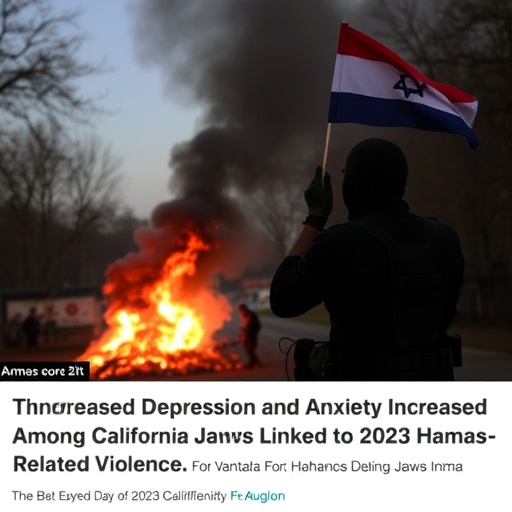In the wake of the October 7, 2023 Hamas attacks targeting Israeli civilians, a groundbreaking study conducted by the University of California, Davis, reveals a stark increase in mental health challenges among Jewish populations residing in Northern California. This research offers unprecedented insight into the extended psychological impact of geopolitical violence, demonstrating how traumatic events, despite occurring thousands of miles away, resonate deeply within diasporic communities. The findings, recently published in the American Psychological Association journal Psychological Trauma: Theory, Research, Practice, and Policy, underscore a profound rise in anxiety and depression symptoms, with antisemitism within the United States functioning as a critical exacerbating factor.
The study, titled “Mental Health in Californian Jews Before and After October 7, 2023,” utilized a survey methodology to analyze the psychological well-being of over 200 Jewish parents with children aged 2 to 18. These participants were observed longitudinally, beginning just before the attacks in September 2023, and continuing through to August 2024. The temporal framework allowed the researchers to capture changes influenced not only by the initial attack but also by subsequent conflict, humanitarian crises in the Middle East, and a disquieting surge in antisemitic incidents across the United States.
Leah C. Hibel, professor of human ecology at UC Davis and lead author of the paper, emphasizes that the psychological toll transcends direct exposure to conflict zones, highlighting the broader socio-cultural ramifications. The study’s critical revelation is the association between increased psychological distress and rising antisemitism on American soil, which compounds the trauma experienced indirectly from geopolitical violence. This duality—external conflict coupled with domestic discrimination—constitutes a profound public health concern with complex psychosocial dynamics.
Quantitatively, the research shows a 30% rise in depressive symptoms and a 45% increase in anxiety symptoms among the surveyed Jewish parents following the October 7 attacks. The prevalence of antisemitic experiences, reported by more than 60% of participants, includes direct encounters such as synagogue vandalism and verbal harassment. The intensity and frequency of these discriminatory episodes reveal how external violence acts as a catalyst for internal community strife and personal psychological vulnerability.
Importantly, this research contributes to a nuanced understanding of how minority communities psychologically navigate intersecting layers of trauma and prejudice. The findings suggest that mental health professionals must develop culturally informed approaches that respect the unique experiences of antisemitic discrimination while addressing general anxiety and depression symptoms. This tailored care is imperative, as general mental health services may lack the cultural competence to adequately serve Jewish populations affected by both international and local stressors.
Jewish-serving organizations are recognized as critical players in responding to this mental health crisis. The study advocates for expanded community-based mental health interventions, including group therapy, support groups, and communal gatherings. Such modalities can provide a collective healing space, enabling individuals to process the compounded fears linked to geopolitical violence and domestic hate crimes. Additionally, fostering partnerships between Jewish communal leaders and broader mental health agencies could enhance provider competency and facilitate more inclusive mental health care.
On a broader scale, the study situates antisemitism within the wider context of discrimination experienced by other minoritized groups. It acknowledges that similar patterns of perceived discrimination—relating to gender, sexual orientation, race, and ethnicity—also correlate with adverse mental health outcomes. This comparative perspective reinforces the need for comprehensive public health strategies that address discrimination as a determinant of mental health across diverse populations.
The longitudinal survey format employed in this study offers methodologically robust evidence of temporal mental health fluctuations correlated with real-world events. This approach strengthens causal inferences between external sociopolitical factors and psychological well-being, an important advancement in trauma and minority stress research. By capturing data points before and after a major geopolitical moment, the researchers could delineate the immediate and sustained mental health impacts, providing a rare window into the trajectories of community resilience and vulnerability.
In light of the evidence, there is a pressing need for policy-makers, mental health providers, and community organizations to consider the compounded effect of indirect war trauma and localized hate crimes. The psychological ramifications extend beyond individual suffering, potentially influencing broader societal cohesion and community stability. Furthermore, the data underscore how episodes of international violence can ripple through diasporic communities, amplifying pre-existing prejudices and mental health risks in host countries.
This research also invites further investigation into the mechanisms linking experiences of antisemitism with mental health deterioration. Future studies could explore the role of social support networks, coping strategies, and identity affirmation in mediating or exacerbating psychological outcomes. Moreover, examining how media coverage and public discourse surrounding international conflicts affect diasporic minority mental health may elucidate additional pathways of influence.
Crucially, this study pioneers a call to action emphasizing that no community exists in isolation from global events. Just as the Hamas attacks on Israeli civilians had a pronounced psychological effect thousands of miles away, so too might future geopolitical crises affect diverse diasporic populations worldwide. Recognition of these transnational mental health dynamics is essential for developing proactive mental health infrastructures and culturally competent interventions sensitive to global-local intersections.
In conclusion, the University of California, Davis study sheds essential light on how violence and discrimination converge to create urgent public mental health challenges within Jewish communities in California. The documented increases in anxiety and depression linked closely to both geopolitical conflict and domestic antisemitism emphasize an urgent need for targeted mental health responses. As social tensions escalate globally and nationally, this research provides a critical framework for understanding and addressing the evolving mental health landscape among vulnerable populations.
Subject of Research: People
Article Title: Mental health in Californian Jews before and after October 7, 2023
News Publication Date: 28-Jul-2025
Web References:
http://dx.doi.org/10.1037/tra0002011
References:
Hibel, L.C. (2025). Mental Health in Californian Jews Before and After October 7, 2023. Psychological Trauma: Theory, Research, Practice, and Policy. DOI: 10.1037/tra0002011
Keywords:
Antisemitism, mental health, trauma, anxiety, depression, Jewish community, survey research, cultural competence, geopolitical violence, minority stress, psychological distress, public health




